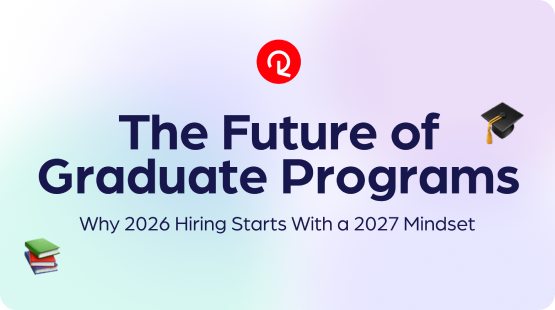The Future of Graduate Programs: Why 2026 Hiring Requires a 2027 Mindset
Blog Post Body
Table of Contents
Talk to a Work Strategist
See the Work Operating System in action and start re-engineering work for AI.
Subscribe to our newsletter
The latest insights on re-engineering work for AI
It’s graduate hiring season—and around the world, the race is on to secure top early talent.
From multinational banks to government agencies to global tech giants, employers are already recruiting grads for programs launching in 2026.
But here’s the real challenge: the work these grads will be doing when they arrive doesn’t yet exist in most job descriptions.
The smartest employers aren’t just asking who they’ll hire.
They’re asking: What work will our grads actually do?
Because the decisions organizations are making right now—in AI adoption, work design, and skills strategy—are already shaping the day-to-day roles of the 2026 and 2027 graduate cohorts.
As AI continues to reshape how work gets done, graduate programs must evolve from static pipelines to future-fit platforms that align with emerging tasks—not legacy job titles.
The nature of graduate work is shifting—fast.
Most graduate programs are still built on outdated job structures:
→ Fixed role titles
→ Static responsibilities
→ Assumptions about early career pathways that haven’t been updated in years
But AI and automation are moving faster than most workforce strategies can keep up.
A recent PwC CEO Survey 2024 found that 69% of global leaders believe generative AI will significantly change how their business creates value in the next 3 years. And critically, 52% expect that most of their workforce will need to reskill as a result.
At the same time, the World Economic Forum’s Future of Jobs Report 2023 notes that 44% of core skills across jobs are expected to change by 2027, and 6 in 10 workers will require training before 2027—but only half have access to adequate training today.
This shift is already being felt across entry-level hiring.
And yet, many graduate programs are still built around work that no longer exists—or soon won’t.
The new imperative: Design around tasks, not titles.
To stay relevant, graduate programs need a radical rethink.
That starts with better questions:
- What tasks will grads actually be doing in 2027—not 2023?
- What will be automated or AI-augmented by the time they start?
- What tech fluency, behavioural skills, and systems knowledge will be essential?
- How do we create pathways that evolve with the work itself?
From advanced manufacturing to financial services to global healthcare, the shape of early career work is already being transformed by data, automation, and AI-enabled processes.
If you’re still defining graduate success by a role description, you’re not preparing talent—you’re setting them up to underdeliver in a job that’s shifting beneath their feet.
The solution: Workforce data that’s built for transformation.
To truly future-proof graduate hiring, organizations need task-level intelligence.
This means moving beyond role-based thinking and tapping into live data on:
- The tasks AI is replacing or augmenting
- The capabilities emerging inside your business
- The skills pathways grads need to move from onboarding to impact—faster
Governments and institutions around the world are recognizing this shift.
The OECD’s AI and the Future of Skills report urges organizations to rethink planning at the task level to close the growing gap between technology rollout and human capability.
At the same time, initiatives like UNESCO’s Global Skills Academy aim to build future-ready skills for young people and early talent through digital learning and workforce intelligence.
This isn’t just about filling grad roles.
It’s about using your graduate program to drive your entire workforce strategy forward.
Final thought: If you’re forecasting headcount—you should be forecasting work.
This is about more than numbers.
It’s about what grads will do, how they’ll grow, and how work will evolve around them.
The graduate programs that will win in 2027 are being redesigned right now—with clarity, intent, and insight.
When we stop hiring into outdated structures—and start designing around the reality of how work is evolving—we unlock a graduate workforce with zero wasted potential.
Unsure how AI is reshaping early talent? Talk to a Work Strategist to find out.
Talk to a Work Strategist
See the Work Operating System in action and start re-engineering work for AI.
Subscribe to our newsletter
The latest insights on re-engineering work for AI


